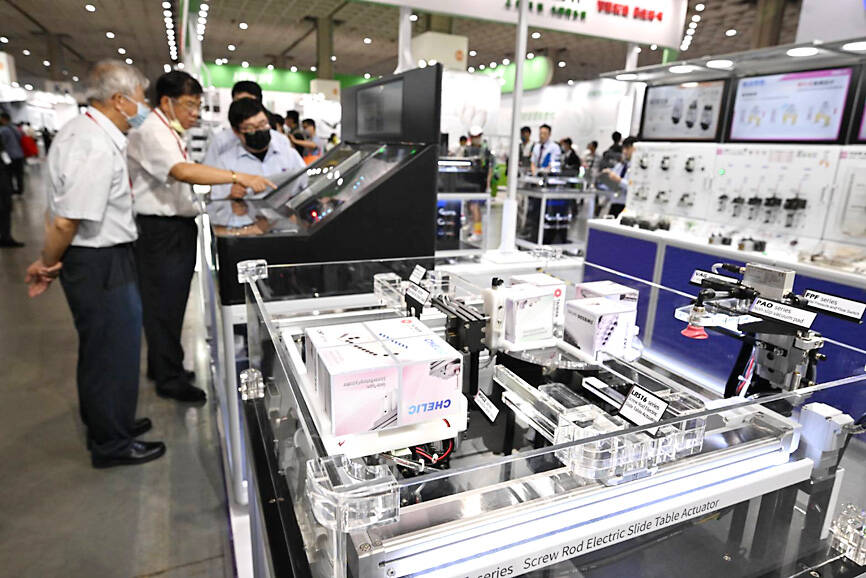The manufacturing industry’s business climate monitor in October flashed “yellow-blue” for a fourth consecutive month, indicating sluggishness, as the operating environment and demand picked up, but selling prices and input budget dropped further, the Taiwan Institute of Economic Research (TIER, 台灣經濟研究院) said yesterday.
The composite index compiled by the Taipei-based think tank gained 0.76 points to 11.59, indicating listless manufacturing activity, as inventory adjustments lingered due to weak end-market demand.
TIER uses five levels to capture the industry’s cyclical movements, with “red” indicating a boom, “green” suggesting steady growth and “blue” signifying a downturn.

Photo: Tien Yu-hua, Taipei Times
Yellow-blue indicates a tepid state and yellow-red a pickup in growth momentum.
Manufacturers that reported a decline in business eased from 40.87 percent in September to 30.36 percent in October, while firms that experienced a slowdown dropped from 50.22 percent to 41.92 percent, the monthly survey found.
Companies whose business remained steady increased from 7.87 percent to 26.79 percent, while firms that reported an increase slid from 1.04 percent to 0.93 percent, it said, adding that none saw a boom.
Electronics companies said that business was steady, as robust demand for artificial intelligence (AI) and cloud services lifted the suppliers of servers and graphic cards by double-digit percentage points, TIER said.
That helped offset continued inventory corrections at chipmakers and optical device vendors, it said.
The AI bonus underpinned the uptick in subindices of operating conditions, demand and costs, while sticky global inflation and restrictive monetary policies continued to weigh on other subindices, such as selling prices and input spending, the institute said.
Suppliers of transportation tools and auto parts also said that business was steady, backed by healthy auto sales in Taiwan, it said.
Furthermore, a growing number of Taiwanese firms are taking part in the global supply chains of electric vehicles (EVs) and benefited from increasing EV demand in China and the US, TIER said.
Textile and paper product makers remained mired in a recession, as a global slowdown curtailed demand and rivals from China cut prices to win customers, the institute said.
The Israel-Hamas war boosted international oil prices and benefitted local petrochemical product makers, lifting their business climate gauge from blue to yellow-blue.
Base metal suppliers floundered due to soft restocking demand from downstream customers, stopping them from buying input materials, the institute said.
Metal product vendors fared better, thanks to demand from consumer electronics gadgets ahead of the holiday season, it said.

The US dollar was trading at NT$29.7 at 10am today on the Taipei Foreign Exchange, as the New Taiwan dollar gained NT$1.364 from the previous close last week. The NT dollar continued to rise today, after surging 3.07 percent on Friday. After opening at NT$30.91, the NT dollar gained more than NT$1 in just 15 minutes, briefly passing the NT$30 mark. Before the US Department of the Treasury's semi-annual currency report came out, expectations that the NT dollar would keep rising were already building. The NT dollar on Friday closed at NT$31.064, up by NT$0.953 — a 3.07 percent single-day gain. Today,

‘SHORT TERM’: The local currency would likely remain strong in the near term, driven by anticipated US trade pressure, capital inflows and expectations of a US Fed rate cut The US dollar is expected to fall below NT$30 in the near term, as traders anticipate increased pressure from Washington for Taiwan to allow the New Taiwan dollar to appreciate, Cathay United Bank (國泰世華銀行) chief economist Lin Chi-chao (林啟超) said. Following a sharp drop in the greenback against the NT dollar on Friday, Lin told the Central News Agency that the local currency is likely to remain strong in the short term, driven in part by market psychology surrounding anticipated US policy pressure. On Friday, the US dollar fell NT$0.953, or 3.07 percent, closing at NT$31.064 — its lowest level since Jan.

The New Taiwan dollar and Taiwanese stocks surged on signs that trade tensions between the world’s top two economies might start easing and as US tech earnings boosted the outlook of the nation’s semiconductor exports. The NT dollar strengthened as much as 3.8 percent versus the US dollar to 30.815, the biggest intraday gain since January 2011, closing at NT$31.064. The benchmark TAIEX jumped 2.73 percent to outperform the region’s equity gauges. Outlook for global trade improved after China said it is assessing possible trade talks with the US, providing a boost for the nation’s currency and shares. As the NT dollar

The Financial Supervisory Commission (FSC) yesterday met with some of the nation’s largest insurance companies as a skyrocketing New Taiwan dollar piles pressure on their hundreds of billions of dollars in US bond investments. The commission has asked some life insurance firms, among the biggest Asian holders of US debt, to discuss how the rapidly strengthening NT dollar has impacted their operations, people familiar with the matter said. The meeting took place as the NT dollar jumped as much as 5 percent yesterday, its biggest intraday gain in more than three decades. The local currency surged as exporters rushed to